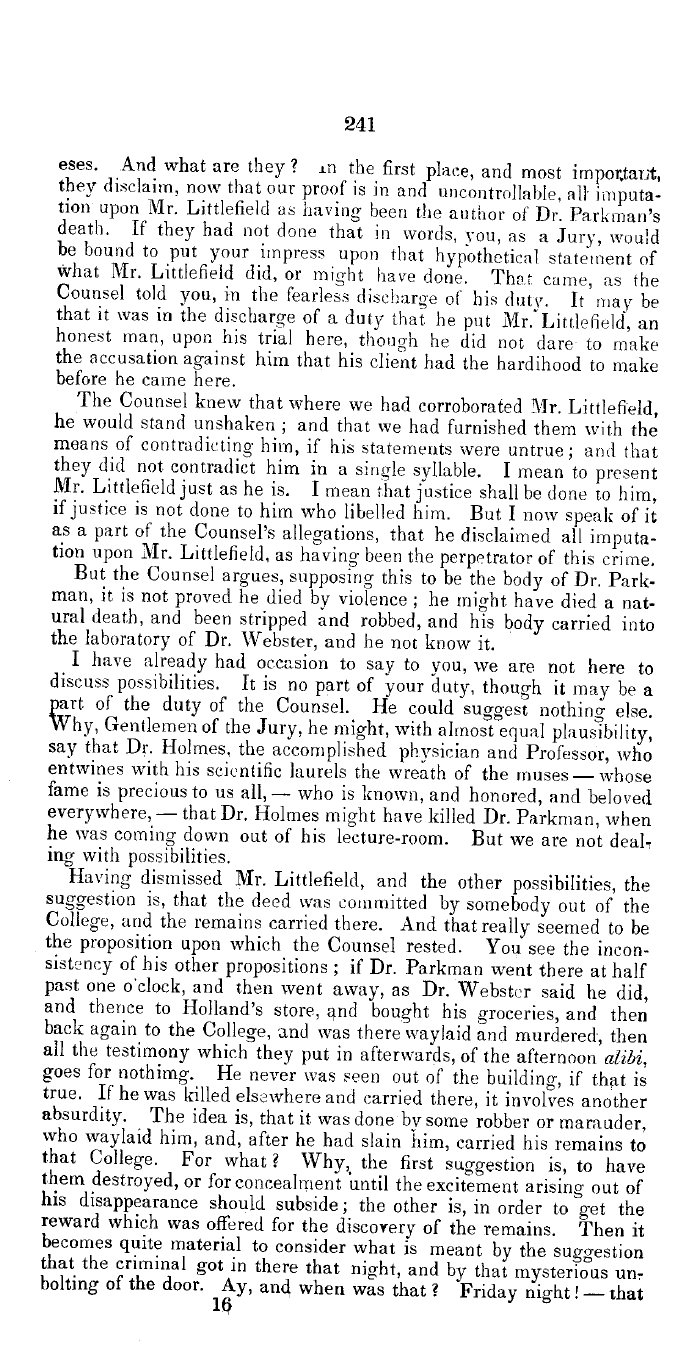|
241
eses. And what are they ? _Ln the first place, and most important,
they disclaim, now that our proof is in and uncontrollable, all imputa-
tion upon Mr. Littlefield as having been the author of Dr. Parkrnan's
death. If they had not done that in words, vou, as a Jury, would
be bound to put your impress upon that hypothetical statement of
what Mr. Littlefield did, or might have done. That. came, as the
Counsel told vou, in the fearless discharge of his duty. It may be
that it was in the discharge of a duty that he put 1Hr.-Littlefield, an
honest man, upon his trial here, though he did not dare to make
the accusation against him that his client had the hardihood to make
before he came here.
The Counsel knew that where we had corroborated Mr. Littlefield,
he would stand unshaken ; and that we had furnished them with the
means of contradicting him, if his statements were untrue; and that
they did not. contradict him in a single syllable. I mean to present
Mr. Littlefield just as he is. I mean that justice shall be done to him,
if justice is not done to him who libelled him. But I now speak of it
as a part of the Counsel's allegations, that he disclaimed all imputa-
tion upon Mr. Littlefield, as having been the perpetrator of this crime.
But the Counsel argues, supposing- this to be the body of Dr. Park-
man, it is not proved he died by violence ; he might have died a nat-
ural death, and been stripped and robbed, and his body carried into
the laboratory of Dr. Webster, and he not know it.
I have already had occasion to say to you, we are not here to
discuss possibilities. It is no part of your duty, though it may be a
part, of the duty of the Counsel. He could suggest nothing else.
Why Gentlemen of the Jury, he might, with almost equal plausibility,
say that Dr. Holmes, the accomplished physician and Professor, who
entwines with his scientific laurels the wreath of the reuses-whose
fame is precious to us all, - who is known, and honored, and beloved
everywhere,- that Dr. Holmes might have killed Dr. Parkman, when
he was coming down out of his lecture-room. But we are not deal-
ing with possibilities.
Having dismissed Mr. Littlefield, and the other possibilities, the
suggestion is, that the deed was committed by somebody out of the
College, and the remains carried there. And that really seemed to be
the proposition upon which the Counsel rested. You see the incon-
sistency of his other propositions ; if Dr. Parkman went there at half
past one o'clock, and then went away, as Dr. Webster said he did,
and thence to Holland's store, and bought his groceries, and then
back again to the College and was there waylaid and murdered, then
all the testimony which they put in afterwards, of the afternoon alibi,
goes for nothimg. He never was seen out of the building, if that is
true. If he was [Tilled elsewhere and carried there, it involves another
absurdity. The idea is, that it was done by some robber or marauder,
who waylaid him, and, after he had slain him, carried his remains to
that College. For what? Why,, the first suggestion is, to have
them destroyed, or for concealment until the excitement arising out of
his disappearance should subside; the other is, in order to get the
reward which was offered for the discovery of the remains. Then it
becomes quite material to consider what is meant by the suggestion
that the criminal got in there that night, and by that mysterious un-
bolting of the door. Ay, and when was that ? Friday night! - that
1fj
|

